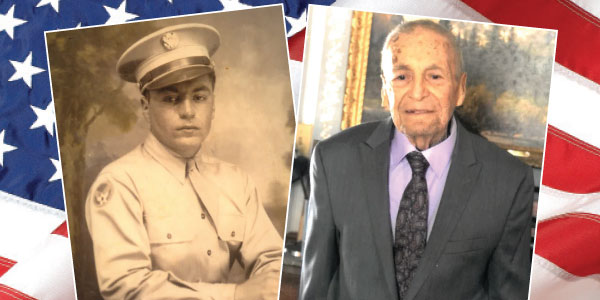
Veteran Solomen Rangel turned 99 last month. In his nearly 100 years of life, Rangel has built a good legacy for his four children. Rangel not only enlisted and became a sergeant in the U.S. Army Air Forces during World War Il; he later fought employment discrimination and segregation on the home front. His son, Alfred Rangel Sr., a veteran himself, shared with Dos Mundos a little about the life behind his father’s legacy.
The Mexican-American grew up in Turner, Kansas. After his father was murdered, Rangel economically supported his mom and younger siblings before and during World War II. Even when Rangel is the oldest of his siblings, he only has his youngest brother still alive.
For some years before he went into the Army, Rangel and his mother worked side by side, picking radishes and beets in the ranch fields in Nebraska. Later, the faithful Catholic believer followed his father’s footsteps and became an engine wiper at the Santa Fe Railroad.
According to Alfred, his father was inducted into the U.S. Army on Feb. 22, 1943, as a toxic handler specialist for World War II with the 771st Chemical earned him multiple military awards. The veteran recognitions include the American service medal, the European–African–Middle Eastern Campaign Medal, a World War Two victory medal, and a good conduct medal.
“He would tell us the horrors of war or India,” Rangel’s son shared. “It was just a very bad time there. Everybody was dying from cholera, typhoid, dysentery, and malaria. He stayed four months later, just after the war ended when everybody went home. When he was there in India, he was supporting his family here in Turner, Kansas.”
His 3 years of service handling mustard and phosgene gas towards the end of the battle got him a disability. But Rangel never stopped in the face of the obstacles that life presented to him. After the war, he was among a group of men who fought against employment discrimination at Santa Fe Railway company. He was one of four men who filed a formal government complaint and endured years of waiting for a resolution.
“He would also explain to us the hardships of working during the railroad segregation,” Alfred said. “They came back after the war, and (people who stayed) wanted them to start again. Additionally, white people would have their own bathrooms, showers, and eating areas, and they wouldn’t allow Hispanics to be supervisors back then. After protests, they finally agreed and gave them back some positions.”
Rangel also fought discrimination and segregation when trying to join the Caucasian American Veterans Legions. Alfred explained a few Hispanic veterans got together and started their own 213 American Legion in Argentine after being rejected by the others. They started their union and American League meetings in an old schoolhouse on the railroad. Additionally, Rangel became known in the community for organizing successful dances for the American Legion. The man was one of the first persons to bring Tex Mex bands to Argentine, Kansas.
Only holding an eighth-grade education didn’t stop Rangel from standing up for his beliefs and getting ahead. According to Alfred, his father had the mind of a college student. His son’s testimony is supported by the facts, as he became a prosperous entrepreneur in the rental business. Owning the apartments and knowing how to maintain them allowed him to provide food for his children and travel with his wife worldwide.
Today, Rangel is fighting the last stages of dementia as the only charter member of the post 213 American Legion in Argentine, Kansas, alive.
Veterano hispano de la Segunda Guerra Mundial construye un legado
En sus casi 100 años de vida, el veterano de la Segunda Guerra Mundial Solomen Rangel ha construido un legado para sus cuatro hijos.
Rangel, que cumplió 99 años en marzo, se enlisto y convirtió en sargento de las Fuerzas Aéreas del Ejército de Estados Unidos durante la Segunda Guerra Mundial. Después de la guerra, se convirtió en miembro fundador del American Legion Post 213 en la zona de Argentine en Kansas City, Kansas.
Después de la guerra, Rangel luchó contra la discriminación laboral y la segregación. Su hijo, Alfred Sr., habló recientemente del legado de su padre, que ahora lucha contra las últimas fases de demencia.
De origen mexicano, Solomen Rangel creció en Turner, Kansas, ahora una zona de Kansas City, Kansas. Tras el asesinato de su padre, ayudó a mantener a su madre y a sus hermanos menores antes y durante la Segunda Guerra Mundial.
Durante algunos años, antes de alistarse en el ejército, Solomen Rangel y su madre trabajaron mano a mano, recogiendo rábanos y remolachas en los campos del rancho en Nebraska. Más tarde, siguió los pasos de su padre y se convirtió en limpiador de motores del ferrocarril de Santa Fe.
Según Alfred Rangel, su padre ingresó en el ejército el 22 de febrero de 1943 como especialista en manipulación de gases tóxicos en la 771ª Compañía de Depósitos Químicos, obteniendo múltiples honores, entre ellos la Medalla de la Campaña de Europa, África y Oriente Medio, la Medalla de la Victoria de la Segunda Guerra Mundial y la Medalla de Buena Conducta.
“Nos contaba los horrores de la guerra en la India”, dijo Alfred Rangel, también veterano. “Eran tiempos muy malos allí. Todo el mundo se moría de cólera, tifus, disentería y malaria”. Se quedó cuatro extras, justo después de que la guerra terminara, cuando todo el mundo volvió a casa. Cuando estaba allí en la India, mantenía a su familia aquí en Turner, Kansas”.
Los tres años de servicio de Rangel manejando gas mostaza y fosgeno hacia el final de la guerra le dejaron una discapacidad. Pero nunca se detuvo ante los obstáculos que le presentaba la vida. Después de la guerra, formó parte de un grupo de hombres que lucharon contra la discriminación laboral en Santa Fe. Uno de los cuatro que presentaron una queja formal ante el gobierno, esperó años para obtener una resolución.
“También nos explicaba las dificultades de trabajar durante la segregación ferroviaria”, dice Alfred Rangel. “Volvieron después de la guerra, y (la gente que se quedó) quería que empezaran (desde abajo) de nuevo. Además, los blancos tenían sus propios baños, duchas y áreas para comer, y no permitían que los hispanos fueran supervisores en ese entonces. Después de las protestas, finalmente accedieron y les devolvieron algunos puestos”.
Solomen Rangel también luchó contra la discriminación y la segregación al intentar unirse a las organizaciones de veteranos estadounidenses de raza blanca. Unos cuantos veteranos hispanos crearon su propio puesto de la American Legion en Argentine tras ser rechazados por los demás, dijo su hijo. Al principio, se reunían en una vieja escuela.
Solomen Rangel se hizo conocido en la comunidad por organizar bailes de la American Legion. En concreto, fue uno de los primeros en traer bandas de Tex-Mex a Argentine, según su hijo.
El sólo tener educación hasta el octavo grado no impidió a Solomen Rangel salir adelante en los negocios, según su hijo. De acuerdo a su hijo, Solomen Rangel tenía mentalidad de un estudiante universitario. Con el tiempo, Rangel se dedicó al negocio del alquiler, siendo propietario de apartamentos. El negocio le permitió no sólo mantener a sus hijos, sino también viajar por el mundo con su esposa.
Hoy, Rangel lucha contra la demencia y es el único miembro fundador de la American Legion Post 213 en Argentine que aún vive.









